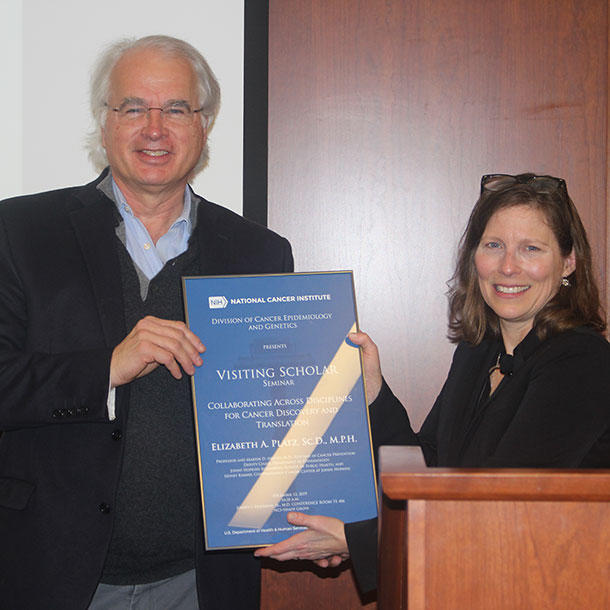Elizabeth Platz Delivers Seminar on Trans-Disciplinary Epidemiology Research on Prostate Cancer
In December 2019, Elizabeth A. Platz, Sc.D., Professor and Deputy Chair of the Department of Epidemiology at Johns Hopkins Bloomberg School of Public Health, spent two days at DCEG as a Visiting Scholar.
Her lecture, entitled, “Collaborating across disciplines for cancer discovery and translation”, was the focal point of her visit, hosted by Michael B. Cook, Ph.D., Senior Investigator in the Metabolic Epidemiology Branch (MEB), and Lauren Hurwitz, Ph.D., Postdoctoral Fellow in MEB. Dr. Platz’s seminar described the trans-disciplinary research approach she applies to the study of prostate, colorectal, and lung cancer etiology. In collaboration with the Prostate Cancer Prevention Trial (PCPT), Dr. Platz and colleagues found that intra-prostatic inflammation was both common in the population and a risk factor for prostate cancer. Through analysis of tissue samples collected at the end of the PCPT, they found that percent chronic inflammation in prostate tissue was high even among men without prostate infection or cancer. In collaboration with PCPT investigators and biostatisticians, they were able to set up a prospective study of men without prostate cancer or infection, through PCPT-Select, a smaller follow-up study, and by linking to medical records and cancer registry data to follow study participants over time. Without this combined effort, a prospective study with collected tissue samples from men without standard indication for prostate biopsy would not have been possible, highlighting the critical importance of collaboration in the advancement of this research.
In addition to her work in inflammation, Dr. Platz collaborated with pathologists to investigate whether telomere length in prostate tissue could be used as a prognostic biomarker for prostate cancer. While telomere length has been associated with overall cancer risk, Dr. Platz and colleagues analyzed digital images of prostate cancer tissue and found that variability in telomere length was a more significant indicator of poor prognosis: men with highly variable telomere length in cancer cells and short telomeres in stromal cells had the highest risk of prostate cancer death. Through additional analysis, they found that telomere variability and length was prognostic even among men with intermediate Gleason scores. Their examinations of modifiable risk factors, such as obesity and smoking, also indicate the significance of telomere length and variability in prostate cancer prognosis. Overweight and obesity was associated with shorter telomeres in prostate cells and higher risk of disease recurrence, while increased physical activity was associated with longer telomeres and lower risk of recurrence. Smoking was significantly associated with increased telomere variability and the highest risk of recurrence—among men who continued to smoke after diagnosis and treatment, a third experienced disease recurrence.
Dr. Platz’s research on colorectal and lung cancer has been the result of collaboration with the Atherosclerosis Risk in Communities (ARIC) Study, a robust resource for epidemiological research thanks to specific details from full clinical dental exams on all study participants. Data from this study indicates an association between periodontal disease and risk for colorectal and lung cancers, even among non-smokers. Further research is needed to examine the mechanism of association between periodontal disease and cancer risk, especially given that periodontal disease is a modifiable risk factor.
Beyond her lecture, Dr. Platz led two roundtable discussions. In the first, “Optimizing Interdisciplinary Cancer Research,” she imparted lessons learned from her experience working across disciplines, such as the challenge of ensuring clear communication across disciplines and providing adequate incentive to keep collaborators motivated and committed. In the second roundtable, “Contemporary Issues in Publishing Cancer Epidemiology Research,” she shared an overview of the editorial process, insights on how to overcome hurdles to publication, her path to becoming Editor-In-Chief of CEBP, advice on how to be invited to join editorial review boards, and the importance of finding mentors who will support junior faculty in their publication efforts. Dr. Platz also met individually with several senior investigators and fellows to discuss their research and opportunities for collaboration.
Outside of these formal discussions, Dr. Platz joined fellows for a brown-bag lunch, organized by Dr. Hurwitz, where they covered topics including the importance of research translation and creative solutions to ensure sustained funding. “I was struck by her idea to reach out to private funders to cover the cost of expensive equipment needed for a research project,” commented Michael Kebede, M.P.H., Postbaccalaureate Fellow in the Integrated Tumor Epidemiology Branch. “One piece of advice that stood out to me,” Dr. Hurwitz noted, “was the need to think about translation throughout the research process, from the point of formulating the research question to disseminating the findings. If there is a potential application to public health, we need to take all the necessary steps from the get-go to ensure that translation remains possible.” Dr. Platz reiterated the importance of collaboration in generating high-quality science and encouraged DCEG fellows to persevere in pursuing multi-disciplinary work.
